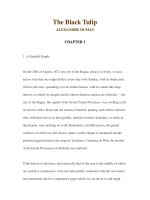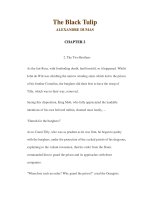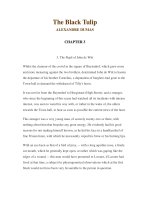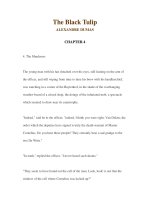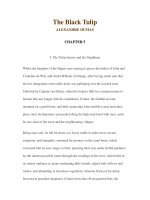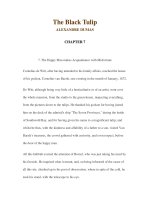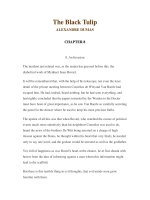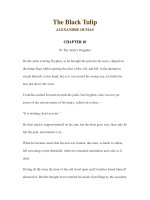LUYỆN ĐỌC TIẾNG ANH QUA CÁC TÁC PHẨM VĂN HỌC –The Black Tulip ALEXANDRE DUMAS CHAPTER 5 ppsx
Bạn đang xem bản rút gọn của tài liệu. Xem và tải ngay bản đầy đủ của tài liệu tại đây (33.03 KB, 13 trang )
The Black Tulip
ALEXANDRE DUMAS
CHAPTER 5
5. The Tulip-fancier and his Neighbour
Whilst the burghers of the Hague were tearing in pieces the bodies of John and
Cornelius de Witt, and whilst William of Orange, after having made sure that
his two antagonists were really dead, was galloping over the Leyden road,
followed by Captain van Deken, whom he found a little too compassionate to
honour him any longer with his confidence, Craeke, the faithful servant,
mounted on a good horse, and little suspecting what terrible events had taken
place since his departure, proceeded along the high road lined with trees, until
he was clear of the town and the neighbouring villages.
Being once safe, he left his horse at a livery stable in order not to arouse
suspicion, and tranquilly continued his journey on the canal-boats, which
conveyed him by easy stages to Dort, pursuing their way under skilful guidance
by the shortest possible routes through the windings of the river, which held in
its watery embrace so many enchanting little islands, edged with willows and
rushes, and abounding in luxurious vegetation, whereon flocks of fat sheep
browsed in peaceful sleepiness. Craeke from afar off recognised Dort, the
smiling city, at the foot of a hill dotted with windmills. He saw the fine red
brick houses, mortared in white lines, standing on the edge of the water, and
their balconies, open towards the river, decked out with silk tapestry
embroidered with gold flowers, the wonderful manufacture of India and China;
and near these brilliant stuffs, large lines set to catch the voracious eels, which
are attracted towards the houses by the garbage thrown every day from the
kitchens into the river.
Craeke, standing on the deck of the boat, saw, across the moving sails of the
windmills, on the slope of the hill, the red and pink house which was the goal of
his errand. The outlines of its roof were merging in the yellow foliage of a
curtain of poplar trees, the whole habitation having for background a dark grove
of gigantic elms. The mansion was situated in such a way that the sun, falling on
it as into a funnel, dried up, warmed, and fertilised the mist which the verdant
screen could not prevent the river wind from carrying there every morning and
evening.
Having disembarked unobserved amid the usual bustle of the city, Craeke at
once directed his steps towards the house which we have just described, and
which white, trim, and tidy, even more cleanly scoured and more carefully
waxed in the hidden corners than in the places which were exposed to view
enclosed a truly happy mortal.
This happy mortal, rara avis, was Dr. van Baerle, the godson of Cornelius de
Witt. He had inhabited the same house ever since his childhood, for it was the
house in which his father and grandfather, old established princely merchants of
the princely city of Dort, were born.
Mynheer van Baerle the father had amassed in the Indian trade three or four
hundred thousand guilders, which Mynheer van Baerle the son, at the death of
his dear and worthy parents, found still quite new, although one set of them bore
the date of coinage of 1640, and the other that of 1610, a fact which proved that
they were guilders of Van Baerle the father and of Van Baerle the grandfather;
but we will inform the reader at once that these three or four hundred thousand
guilders were only the pocket money, or sort of purse, for Cornelius van Baerle,
the hero of this story, as his landed property in the province yielded him an
income of about ten thousand guilders a year.
When the worthy citizen, the father of Cornelius, passed from time into eternity,
three months after having buried his wife, who seemed to have departed first to
smooth for him the path of death as she had smoothed for him the path of life,
he said to his son, as he embraced him for the last time,
"Eat, drink, and spend your money, if you wish to know what life really is, for
as to toiling from morn to evening on a wooden stool, or a leathern chair, in a
counting-house or a laboratory, that certainly is not living. Your time to die will
also come; and if you are not then so fortunate as to have a son, you will let my
name grow extinct, and my guilders, which no one has ever fingered but my
father, myself, and the coiner, will have the surprise of passing to an unknown
master. And least of all, imitate the example of your godfather, Cornelius de
Witt, who has plunged into politics, the most ungrateful of all careers, and who
will certainly come to an untimely end."
Having given utterance to this paternal advice, the worthy Mynheer van Baerle
died, to the intense grief of his son Cornelius, who cared very little for the
guilders, and very much for his father.
Cornelius then remained alone in his large house. In vain his godfather offered
to him a place in the public service, in vain did he try to give him a taste for
glory, although Cornelius, to gratify his godfather, did embark with De
Ruyter upon "The Seven Provinces," the flagship of a fleet of one hundred and
thirty-nine sail, with which the famous admiral set out to contend singlehanded
against the combined forces of France and England. When, guided by the pilot
Leger, he had come within musket-shot of the "Prince," with the Duke of York
(the English king's brother) aboard, upon which De Ruyter, his mentor, made so
sharp and well directed an attack that the Duke, perceiving that his vessel would
soon have to strike, made the best of his way aboard the "Saint Michael"; when
he had seen the "Saint Michael," riddled and shattered by the Dutch broadside,
drift out of the line; when he had witnessed the sinking of the "Earl of
Sandwich," and the death by fire or drowning of four hundred sailors; when he
realized that the result of all this destruction after twenty ships had been
blown to pieces, three thousand men killed and five thousand injured was that
nothing was decided, that both sides claimed the victory, that the fighting would
soon begin again, and that just one more name, that of Southwold Bay, had been
added to the list of battles; when he had estimated how much time is lost simply
in shutting his eyes and ears by a man who likes to use his reflective powers
even while his fellow creatures are cannonading one another; Cornelius bade
farewell to De Ruyter, to the Ruart de Pulten, and to glory, kissed the knees of
the Grand Pensionary, for whom he entertained the deepest veneration, and
retired to his house at Dort, rich in his well-earned repose, his twenty-eight
years, an iron constitution and keen perceptions, and his capital of more than
four hundred thousands of florins and income of ten thousand, convinced that a
man is always endowed by Heaven with too much for his own happiness, and
just enough to make him miserable.
Consequently, and to indulge his own idea of happiness, Cornelius began to be
interested in the study of plants and insects, collected and classified the Flora of
all the Dutch islands, arranged the whole entomology of the province, on which
he wrote a treatise, with plates drawn by his own hands; and at last, being at a
loss what to do with his time, and especially with his money, which went on
accumulating at a most alarming rate, he took it into his head to select for
himself, from all the follies of his country and of his age, one of the most
elegant and expensive, he became a tulip-fancier.
It was the time when the Dutch and the Portuguese, rivalling each other in this
branch of horticulture, had begun to worship that flower, and to make more of a
cult of it than ever naturalists dared to make of the human race for fear of
arousing the jealousy of God.
Soon people from Dort to Mons began to talk of Mynheer van Baerle's tulips;
and his beds, pits, drying-rooms, and drawers of bulbs were visited, as the
galleries and libraries of Alexandria were by illustrious Roman travellers.
Van Baerle began by expending his yearly revenue in laying the groundwork of
his collection, after which he broke in upon his new guilders to bring it to
perfection. His exertions, indeed, were crowned with a most magnificent result:
he produced three new tulips, which he called the "Jane," after his mother; the
"Van Baerle," after his father; and the "Cornelius," after his godfather; the other
names have escaped us, but the fanciers will be sure to find them in the
catalogues of the times.
In the beginning of the year 1672, Cornelius de Witt came to Dort for three
months, to live at his old family mansion; for not only was he born in that city,
but his family had been resident there for centuries.
Cornelius, at that period, as William of Orange said, began to enjoy the most
perfect unpopularity. To his fellow citizens, the good burghers of Dort,
however, he did not appear in the light of a criminal who deserved to be hung. It
is true, they did not particularly like his somewhat austere republicanism, but
they were proud of his valour; and when he made his entrance into their town,
the cup of honour was offered to him, readily enough, in the name of the city.
After having thanked his fellow citizens, Cornelius proceeded to his old paternal
house, and gave directions for some repairs, which he wished to have executed
before the arrival of his wife and children; and thence he wended his way to the
house of his godson, who perhaps was the only person in Dort as yet
unacquainted with the presence of Cornelius in the town.
In the same degree as Cornelius de Witt had excited the hatred of the people by
sowing those evil seeds which are called political passions, Van Baerle had
gained the affections of his fellow citizens by completely shunning the pursuit
of politics, absorbed as he was in the peaceful pursuit of cultivating tulips.
Van Baerle was truly beloved by his servants and labourers; nor had he any
conception that there was in this world a man who wished ill to another.
And yet it must be said, to the disgrace of mankind, that Cornelius van Baerle,
without being aware of the fact, had a much more ferocious, fierce, and
implacable enemy than the Grand Pensionary and his brother had among the
Orange party, who were most hostile to the devoted brothers, who had never
been sundered by the least misunderstanding during their lives, and by their
mutual devotion in the face of death made sure the existence of their brotherly
affection beyond the grave.
At the time when Cornelius van Baerle began to devote himself to tulip-
growing, expending on this hobby his yearly revenue and the guilders of his
father, there was at Dort, living next door to him, a citizen of the name of Isaac
Boxtel who from the age when he was able to think for himself had indulged the
same fancy, and who was in ecstasies at the mere mention of the word "tulban,"
which (as we are assured by the "Floriste Francaise," the most highly considered
authority in matters relating to this flower) is the first word in the Cingalese
tongue which was ever used to designate that masterpiece of floriculture which
is now called the tulip.
Boxtel had not the good fortune of being rich, like Van Baerle. He had
therefore, with great care and patience, and by dint of strenuous exertions, laid
out near his house at Dort a garden fit for the culture of his cherished flower; he
had mixed the soil according to the most approved prescriptions, and given to
his hotbeds just as much heat and fresh air as the strictest rules of horticulture
exact.
Isaac knew the temperature of his frames to the twentieth part of a degree. He
knew the strength of the current of air, and tempered it so as to adapt it to the
wave of the stems of his flowers. His productions also began to meet with the
favour of the public. They were beautiful, nay, distinguished. Several fanciers
had come to see Boxtel's tulips. At last he had even started amongst all the
Linnaeuses and Tourneforts a tulip which bore his name, and which, after
having travelled all through France, had found its way into Spain, and
penetrated as far as Portugal; and the King, Don Alfonso VI. who, being
expelled from Lisbon, had retired to the island of Terceira, where he amused
himself, not, like the great Conde, with watering his carnations, but with
growing tulips had, on seeing the Boxtel tulip, exclaimed, "Not so bad, by any
means!"
All at once, Cornelius van Baerle, who, after all his learned pursuits, had been
seized with the tulipomania, made some changes in his house at Dort, which, as
we have stated, was next door to that of Boxtel. He raised a certain building in
his court-yard by a story, which shutting out the sun, took half a degree of
warmth from Boxtel's garden, and, on the other hand, added half a degree of
cold in winter; not to mention that it cut the wind, and disturbed all the
horticultural calculations and arrangements of his neighbour.
After all, this mishap appeared to Boxtel of no great consequence. Van Baerle
was but a painter, a sort of fool who tried to reproduce and disfigure on canvas
the wonders of nature. The painter, he thought, had raised his studio by a story
to get better light, and thus far he had only been in the right. Mynheer van
Baerle was a painter, as Mynheer Boxtel was a tulip-grower; he wanted
somewhat more sun for his paintings, and he took half a degree from his
neighbour's tulips.
The law was for Van Baerle, and Boxtel had to abide by it.
Besides, Isaac had made the discovery that too much sun was injurious to tulips,
and that this flower grew quicker, and had a better colouring, with the temperate
warmth of morning, than with the powerful heat of the midday sun. He therefore
felt almost grateful to Cornelius van Baerle for having given him a screen gratis.
Maybe this was not quite in accordance with the true state of things in general,
and of Isaac Boxtel's feelings in particular. It is certainly astonishing what rich
comfort great minds, in the midst of momentous catastrophes, will derive from
the consolations of philosophy.
But alas! What was the agony of the unfortunate Boxtel on seeing the windows
of the new story set out with bulbs and seedlings of tulips for the border, and
tulips in pots; in short, with everything pertaining to the pursuits of a tulip-
monomaniac!
There were bundles of labels, cupboards, and drawers with compartments, and
wire guards for the cupboards, to allow free access to the air whilst keeping out
slugs, mice, dormice, and rats, all of them very curious fanciers of tulips at two
thousand francs a bulb.
Boxtel was quite amazed when he saw all this apparatus, but he was not as yet
aware of the full extent of his misfortune. Van Baerle was known to be fond of
everything that pleases the eye. He studied Nature in all her aspects for the
benefit of his paintings, which were as minutely finished as those of Gerard
Dow, his master, and of Mieris, his friend. Was it not possible, that, having to
paint the interior of a tulip-grower's, he had collected in his new studio all the
accessories of decoration?
Yet, although thus consoling himself with illusory suppositions, Boxtel was not
able to resist the burning curiosity which was devouring him. In the evening,
therefore, he placed a ladder against the partition wall between their gardens,
and, looking into that of his neighbour Van Baerle, he convinced himself that
the soil of a large square bed, which had formerly been occupied by different
plants, was removed, and the ground disposed in beds of loam mixed with river
mud (a combination which is particularly favourable to the tulip), and the whole
surrounded by a border of turf to keep the soil in its place. Besides this,
sufficient shade to temper the noonday heat; aspect south-southwest; water in
abundant supply, and at hand; in short, every requirement to insure not only
success but also progress. There could not be a doubt that Van Baerle had
become a tulip-grower.
Boxtel at once pictured to himself this learned man, with a capital of four
hundred thousand and a yearly income of ten thousand guilders, devoting all his
intellectual and financial resources to the cultivation of the tulip. He foresaw his
neighbour's success, and he felt such a pang at the mere idea of this success that
his hands dropped powerless, his knees trembled, and he fell in despair from the
ladder.
And thus it was not for the sake of painted tulips, but for real ones, that Van
Baerle took from him half a degree of warmth. And thus Van Baerle was to
have the most admirably fitted aspect, and, besides, a large, airy, and well
ventilated chamber where to preserve his bulbs and seedlings; while he, Boxtel,
had been obliged to give up for this purpose his bedroom, and, lest his sleeping
in the same apartment might injure his bulbs and seedlings, had taken up his
abode in a miserable garret.
Boxtel, then, was to have next door to him a rival and successful competitor;
and his rival, instead of being some unknown, obscure gardener, was the godson
of Mynheer Cornelius de Witt, that is to say, a celebrity.
Boxtel, as the reader may see, was not possessed of the spirit of Porus, who, on
being conquered by Alexander, consoled himself with the celebrity of his
conqueror.
And now if Van Baerle produced a new tulip, and named it the John de Witt,
after having named one the Cornelius? It was indeed enough to choke one with
rage.
Thus Boxtel, with jealous foreboding, became the prophet of his own
misfortune. And, after having made this melancholy discovery, he passed the
most wretched night imaginable.
